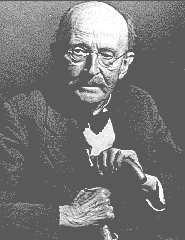 Max Planck
Max Planck Max Planck
Max PlanckPlanck began studying blackbody radiation in 1897 and discovered that at long wavelengths it did not obey the distribution laws given by Wilhelm Wien. This discovery led him to announce (1900) his revolutionary idea that an oscillator could emit energy only in discrete quanta, contrary to classical physical theory. The quantum theory--which gained Planck the Nobel Prize for physics in 1918--was used by Albert Einstein to explain (1905) the photoelectric effect and by Niels Bohr to propose (1913) a model of the atom with quantized electronic states; the theory was later developed into quantum mechanics. Planck mastered every aspect of physics from thermodynamics and electrodynamics to relativity and also wrote extensively on the philosophy of science.
